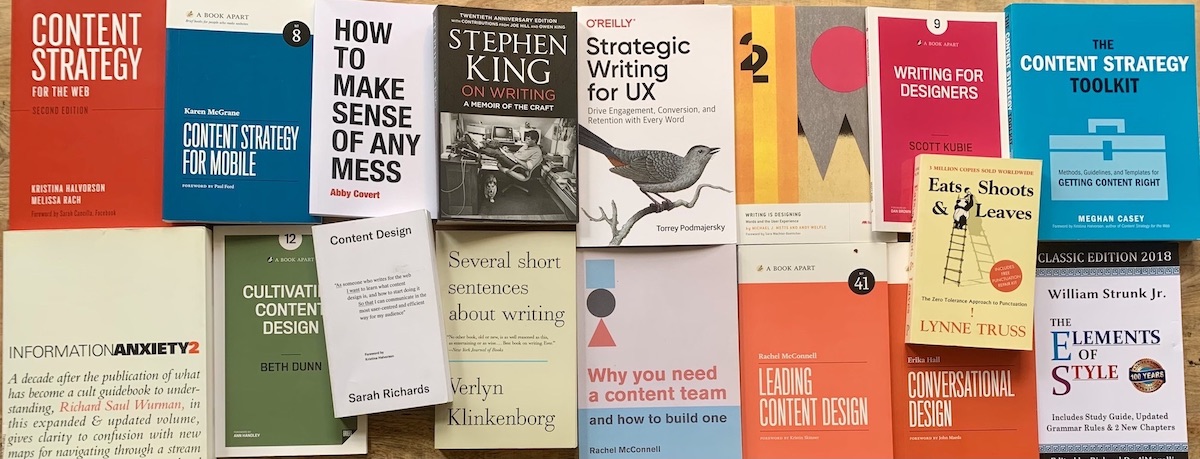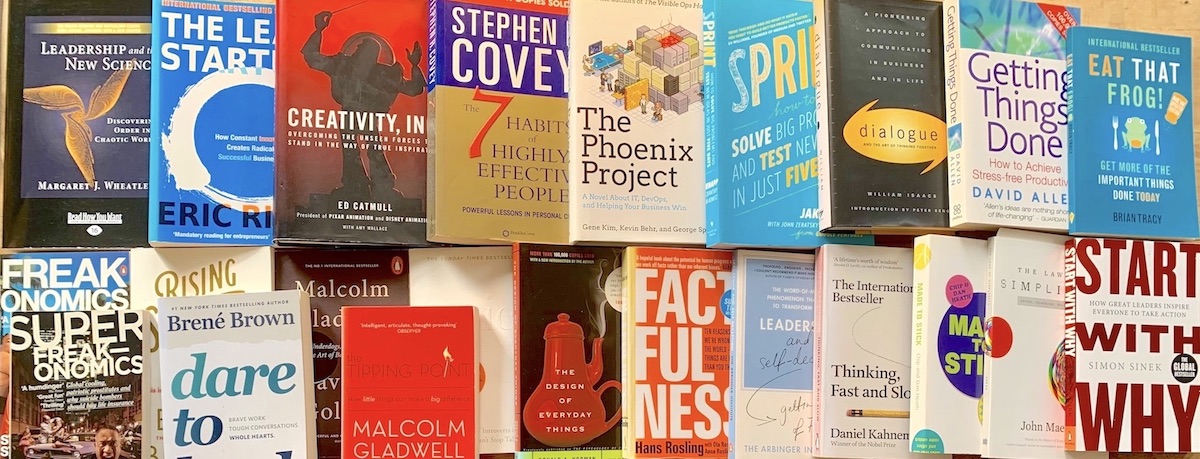Recommended books
Some of the work-related non-fiction that I've read over the last few years. For each book I’ve provided a link to further information and written a one-sentence description.
If you also enjoy reading fiction, do check out this page.

Content design / writing books
- How to Make Sense of Any Mess (2014) by Abby Covert
A nice introduction to some of the main approaches we can use when organizing information.
- Cultivating Content Design (2021) by Beth Dunn
Some good advice on how to create a strong and respected content design practice.
- Content Strategy for the Web (2012) by Kristina Halvorson
Content strategy, governance, steakholder management, data-driven decision making, and much more besides.
- On Writing: A Memoir of the Craft (2000; revised 2020) by Stephen King
Part memoir, part writing masterclass, and an all round entertaining read (as you’d expect).
- Several short sentences about writing (2012) by Verlyn Klinkenborg
A call-to-action to focus more consciously on the words, sounds, and rhythms that make up our sentences.
- Why you need a content team and how to build one (2018) by Rachel McConnell
Lots of good advice about assessing and developing content maturity, skills, and teams.
- Writing is Designing (2020) by Michael Metts and Andy Welfle
A really helpful book (with an apt title) covering most of the core areas of writing for digital products.
- Strategic Writing for UX (2019) by Torrey Podmajersky
A really practical book on creating frameworks and patterns for creating effective content.
- Content Design (2017) by Sarah Richards
I work as a Content Designer, so it’s perhaps no surprise that I’m a big fan of this little book.
- The Elements of Style (1918; revised 2018) by William Strunk Jr.
One of the definitive books on writing style that’s still useful 100 years on.
- Eats, Shoots & Leaves (2003) by Lynne Truss
A fun book about the importance of punctuation in everyday writing.
- Information Anxiety 2 (2001) by Richard Saul Wurman
Quite an old book now, but it contains some useful prompts and approaches to organising information.
And on my "to-read" pile...
- The Content Strategy Toolkit (2015) by Meghan Casey
- Conversational Design (2018) by Erika Hall
- Writing for Designers (2018) by Scott Kubie
- Leading Content Design (2022) by Rachel McConnell

Design / growth / leadership books
- Leadership and Self-Deception (2000) by The Arbinger Institute
I’m fascinated by the extent to which we tend to deceive ourselves, so was naturally drawn to this intriguing volume.
- Rising Strong (2015) and Dare to Lead (2018) by Brené Brown
Books about being brave, trying, failing, rising again, dusting ourselves off, owning our stories — and helping others do the same.
- Quiet by Susan Cain (2012)
A fresh and intelligent look at the introvert/extrovert aspect of our personalities and the power of being, well, quiet.
- Creativity, Inc (2014) by Ed Catmull
Packed with insights about creating and maintaining a creative organization, written by a former president of Pixar.
- The 7 Habits of Highly Successful People (1989) by Stephen R. Covey
If you’ve never read this seminal book, do yourself a huge favour and go beg, borrow, or steal a copy today.
- The Tipping Point (2000) by Malcolm Gladwell
A very readable exploration into how some seemingly small things can lead to major change.
- David and Goliath (2013) by Malcolm Gladwell
A book about underdogs and the many areas of life in which reality is often counter-intuitive.
- Dialogue and the Art of Thinking Together (1999) by William Isaacs
A thorough and fascinating study into how groups of people can learn to better collaborate together.
- Thinking, Fast and Slow (2011) by Daniel Kahneman
An exploration into the different modes of thinking ("fast" and "slow") and the cognitive biases associated with each.
- The Phoenix Project (2013) by G. Kim, K. Behr, and G. Spafford
A good portrayal of life inside a siloed IT department and what DevOps really has to offer.
- Sprint (2016) by Jake Knapp
How to approach opportunities and challenges by ideating, prototyping, testing, and getting feedback — all within 5 days.
- Freakonomics (2005) and SuperFreakonomics (2009) by Steven D. Levitt and Stephen J. Dubner
Applying economic theories to some of life’s many riddles, such as why do drug dealers still live at home with their moms?
- The Design of Everyday Things (1988) by Don Norman
This book was way ahead of its time when it was published in 1988 and is still worth a read today.
- Neuro-linguistic Programming For Dummies (2015) by Romilla Ready and Kate Burton
A good introduction to the core concepts and practices of neuro-linguistic programming.
- Factfulness (2018) by Hans Rosling, Ola Rosling, and Anna Rosling Rönnlund
A fact-based, enlightening, and hope-filled book about what the world is really like.
- The Lean Startup (2011) by Eric Ries
I read this a couple of years ago and it has definitely had a huge impact on how I now approach any new venture.
- Start with Why (2009) by Simon Sinek
How being really clear about your "why" helps you to better communicate with and inspire others.
- Eat that Frog! (2001) by Brian Tracy
A number of appraoches to help you stop procrastinating, prioritise what's important, and ultimately get more done.
- Leadership and the New Science (2006) by Margaret Wheatley
A book that challenges commonly-held perspectives on leadership, management, and how organizations best flourish.
- Coaching for Performance (2017) by Sir John Whitmore
A great introduction to coaching, the GROW model, and how to help raise awareness and responsibility.
And on my "to-read" pile...
- Getting Things Done (2001) by David Allen
- Made to Stick (2007) by Chip and Dan Heath
- The Laws of Simplicity (2006) by John Maeda
